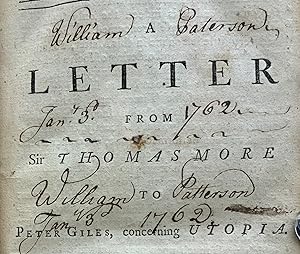About this Item
Utopia: Or the Happy Republic; A Philosophical Romance, In Two Books. Book I. Containing Preliminary Discourses on the happiest State of a Commonwealth. Book II. Containing a Description of the Island of Utopia, The Towns, Magistrates, Mechanick Trades, and Manner of Life of the Utopians, Their Traffick, Travelling, Slaves, Marriages, Military Discipline, Religions. Written in Latin by Sir Thomas More, Lord High Chancellor of England. Translated into English by Gilbert Burnet D.D. Sometime Professor of Divinity in the University of Glasgow, afterwards Bishop of Sarum. Glasgow, Printed by Robert Foulis, 1743. First Foulis Edition, Modern Binding. Constitution signer + Founding Father signature - William Paterson (1745-1806). 139 pp, 7 x 4.25", 12mo. *Lacking frontispiece and pages 132-134 (one leaf). In poor (but restored) condition. Modern paper boards lightly rubbed at edges and leather corners. Leather spine tanned from sun-exposure. Red title label on spine slightly dulled but gilt lettering bright and clean. Modern end-papers clean. Original front paste-down pasted-in over modern front paste-down, with marginalia, including "College of Princeton" in old-hand ink. Frontispiece lacking. Title page is ink-stained with "New Jersey College" above typed "Happy Republic." Water dampness staining throughout text-block's bottom half (text remains legible). Edges of leaves are scuffed & some corners are chipped, making page numbers difficult to read. Pages 132-134 (one leaf) lacking. Toning throughout text-block, some instance of age-staining, but text remains legible. Modern binding tight and intact. Please see photos and ask questions, if any, before purchasing. William Paterson (1745-1806) was an American statesman, lawyer, jurist and singer of the United States Constitution. He was an Associate Justice of the United States Supreme Court, the second governor of New Jersey, and a Founding Father of the United States. Born in County Antrim, Ireland, Paterson moved to the North American British colonies (New Castle, Pennsylvania) at a young age. At 14 years old, in the year 1759, he began college at Princeton (College of New Jersey), where he studied the classics, history, political theory and moral philosophy. He viewed college as the place to develop and perfect his character and to gain proficiency in eloquence and oratorial skill. Following his graduation in 1763, Paterson studied law in the office of Richard Stockton. Though not an early participant in the politics of the day, Paterson became an outspoken supporter of American independence following the outbreak of hostilities in Lexington and Concord. In 1775, he was elected as a delegate from Somerset County to the First Provincial Congress of New Jersey. He later attended the Second Provincial Congress and the Third Provincial Congress, where as secretary, he officially recorded New Jersey's first constitution in 1776. Soon after independence was declared, Paterson was appointed New Jersey's first attorney general by Governor William Livingston. Paterson's long experience in state politics and administration earned him a seat on the five-person delegation sent by New Jersey to the 1787 Constitutional Convention in Philadelphia, where he played a pivotal role. By a narrow margin, delegates approved the Virginia Plan, which provided for proportional representation, based on population, in two houses of government. Paterson introduced the New Jersey Plan, which called for a unicameral body with equal representation from each state. The less populous states were concerned the Virginia Plan would give substantial control of the national government to the more populous states, therefore resulting in their interests being overshadowed. In the debate that followed, the delegates hammered out the Great Compromise, with proportional representation in the House of Representatives and equal representation in the Senate. Paterson signed the Constitution in September, 1787. He was chosen. Seller Inventory # RAREA1743JZZZ
Contact seller
Report this item
![]()




